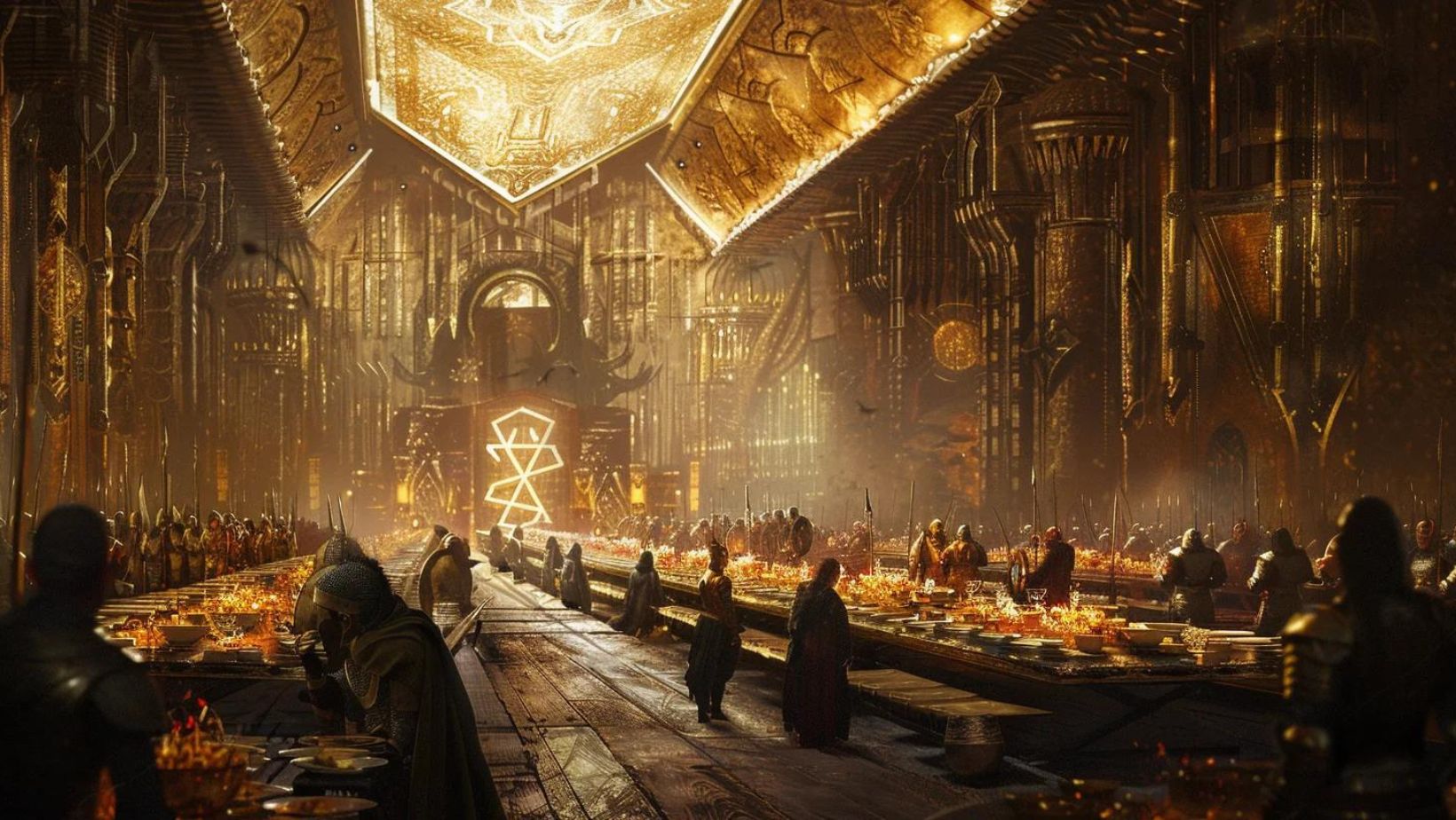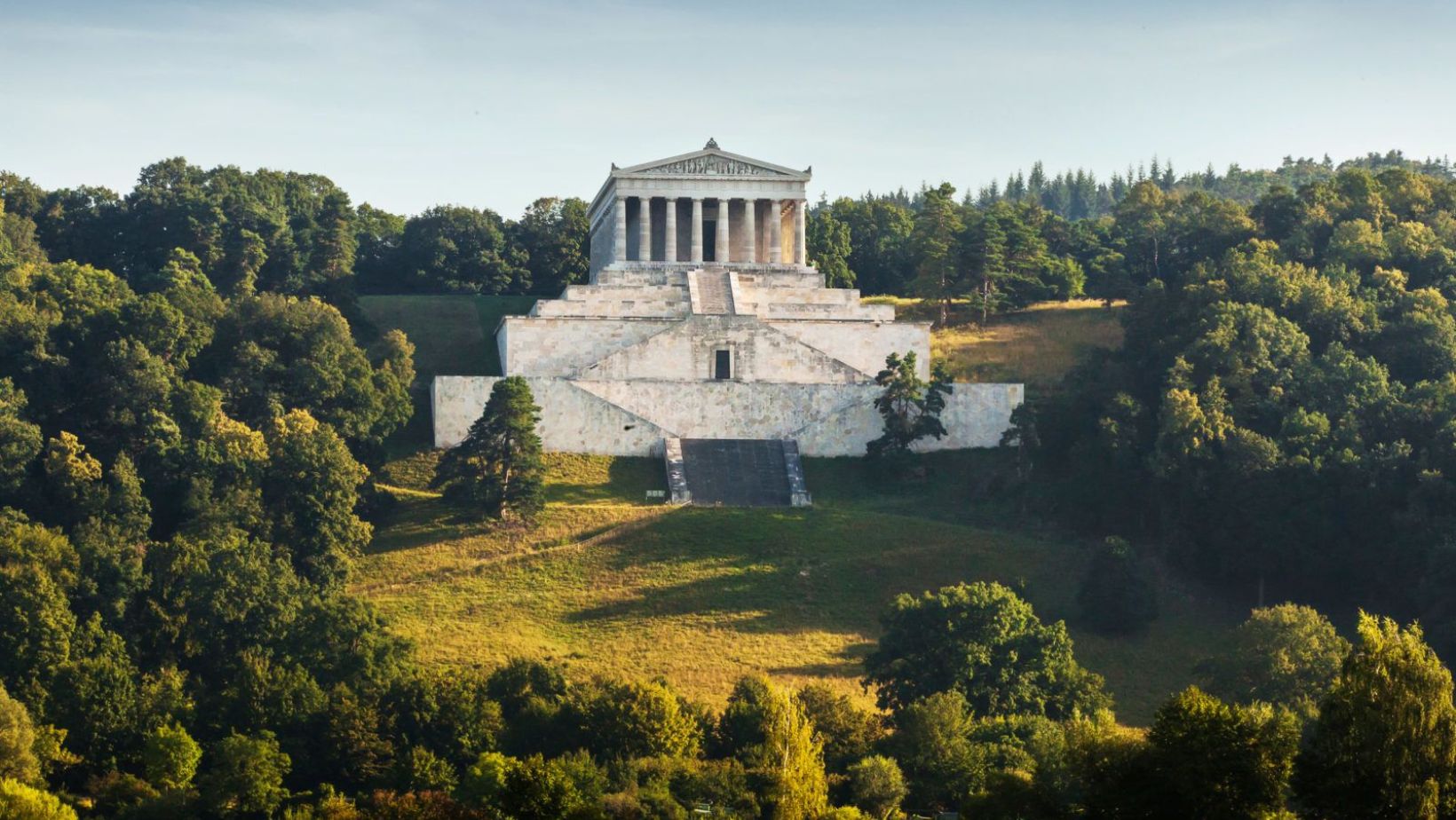Picture this: you’re standing on an ancient, blood-soaked battlefield, and the very air hums with echoes of clashing steel. That’s where the Viking belief in Valhalla kicks in. To them, life was a prelude to something even more epic – an afterlife spent in Odin’s majestic hall.
Viking belief in Valhalla wasn’t just some old myth; it was a prime factor driving warriors to dive headlong into battle fields without fear. Imagine fighting all day and feasting all night among legends—who wouldn’t want that?
Table of Contents:
- Valhalla: The Majestic Hall of the Viking Warrior
- The Spiritual Beliefs of Norse People
- The Influence of Valhalla in Modern Entertainment
- Exploring Real-Life Connections to Ancient Beliefs
- FAQs in Relation to Viking Belief in Valhalla
- Conclusion
Valhalla: The Majestic Hall of the Viking Warrior

The heart of Norse mythology beats loudly in Valhalla, a majestic hall where slain warriors are said to dwell with god Odin. Picture this: roofed with shields, its rafters speared shafts – it’s no mere dwelling place but an afterlife hall fit for the bravest.
The Architectural Splendor of Odin’s Hall: Viking Belief in Valhalla
Built by the Aesir themselves, imagine Valhalla as more than just stone and wood; it stands as a testament to glory. With walls fortified against fear and thatched with golden shields gleaming under Asgard’s sky – here lies eternity’s promise for every viking warrior.
No ordinary retirement residence, this one’s more than your average abode. Every inch screams ‘epic’ louder than war boys on an army field revving towards Valhalla Valkyries in tow.
Valkyries: The Selectors of the Slain
Swooping down from skies amidst battle cries are valkyries – supernatural female figures entrusted with choosing who among fallen warriors deserve eternal feasting and fighting beside Odin himself. Imagine being handpicked by these celestial scouts—talk about making your mama proud.
But wait—there’s more. These fierce ladies aren’t just some heavenly bouncers at a club exclusive only to prime factor brutes from ancient battlefields. They weave destiny itself, guiding souls not merely to rest but preparing them for Ragnarok—the final showdown where gods clash titans like never before seen on earth or beyond.
Preparing for Ragnarok within Valhalla’s Walls: Viking Belief in Valhalla
You’re thinking great Vikings loved nothing more than a good ol’ skirmish? Well sure, Ragnarök‘s impending doom got them jazzed up alright—but they also savored downtime chugging finest mead provided generously by goddess Freyja herself.
In between bouts sharpening swords (and wits), our viking pals enjoyed boar meat aplenty—a feast unending. And when night fell over Bifrost bridge? That same spirit held strong until dawn cracked anew across Yggdrasil’s vast branches—it was day-in-day-out prep time baby because once that horn sounded?
No going back.
Key Takeaway: Viking Belief in Valhalla
Valhalla isn’t just an afterlife; it’s a warrior’s dream with golden shields for roofing and eternal feasts. Valkyries cherry-pick the fallen for this honor, prepping them not just to chill but to throw down at Ragnarok—the ultimate divine smackdown.
The Spiritual Beliefs of Norse People: Viking Belief in Valhalla
Norse mythology, rich and complex, gave the Vikings a unique perspective on life and death. Their spiritual beliefs weren’t just about what they worshipped but how those deities influenced their everyday lives. At the core was an afterlife reserved for the bravest: Valhalla.
The Unchangeable Nature of Fate and Ragnarok
The unchangeable nature of fate was like gravity; you couldn’t fight it, only embrace it. They believed that everything leading up to Ragnarok—the end of days—was predetermined.
This acceptance fueled their desire to live honorably because if fate decided one would fall in battle fields, then reaching Valhalla required dying with sword in hand. It wasn’t morbid—it was motivational.
To them, six hallmarks mattered most: courage, truthfulness, honorability, fidelity towards friends and family (numbers five), as well as hospitality—a warrior soul’s checklist before heading into Odin’s great hall.
Heroes Destined for Valhalla: Viking Belief in Valhalla
Ragnar Lothbrok—one such legend—embodied these virtues through his daring raids across Northern Europe which were no less epic than today’s box-office hits or binge-worthy book series featuring the Viking spirit. His saga added more layers to Norse literature by showing us that bravery could earn even kings entry into glorious afterlife parties where boar meat never ran out.
But remember folks; we’re talking prime real estate here – Valhalla located within Asgard isn’t some mail-order club membership. Entry requirements? Die valiantly seven times over or something close enough on army field amidst bloodshed (statistics may vary).
Valkyries: The Selectors of the Slain
Odin’s hall in Norse mythology. These fierce warriors chose the bravest slain soldiers, ensuring they’d dine with gods in Valhalla.
Key Takeaway: Viking Belief in Valhalla
Vikings lived for an epic afterlife in Valhalla, striving to live with courage and honor because they believed their fate was set—aiming high made every moment count.
Legendary heroes like Ragnar Lothbrok showed that true bravery could score you a spot at Odin’s never-ending feast in the sky.
The Valkyries weren’t just picking random warriors; they were after the elite, those who died bold and brave on the battlefield.
The Influence of Valhalla in Modern Entertainment:Viking Belief in Valhalla
Valhalla’s mighty gates have swung open far beyond the ancient sagas, now captivating hearts in the digital age. The afterlife components once whispered across battle fields now thunder through our speakers and flash across screens, reimagined for a modern audience.
Valhalla’s Portrayal in Video Games
In video games, Valhalla is not just an end; it’s often where the thrill ride begins. Game developers craft worlds that breathe new life into this majestic hall. It becomes more than a resting place for warrior souls—it’s sometimes a starting line for epic quests or even serves as a dynamic setting itself.
Assassin’s Creed: Valhalla, with its gripping narrative set during the Viking Age, invites players to stride alongside legendary figures destined to dine on boar meat within Odin’s Hall. Here gamers don’t just hear about reaching Valhalla; they strive to make their own saga worthy of it.
The allure of these interactive experiences lies partly in their power to let us tread paths warriors walked so long ago—to swing swords and sail northern seas while chasing immortality among gods.
Streaming Epics and the Afterlife Myth: Viking Belief in Valhalla
As we lounge on couches rather than wooden benches at mead halls, streaming services offer us glimpses into realms once unreachable by mortal ken—transforming our living rooms into front-row seats watching Valkyries guide fallen heroes skyward.
Spectacles like Vikings, accessible with merely a click on Netflix, enthrall viewers as fierce Norsemen seek glory enough to grasp eternity among fellow brave warriors under roofed shields—an army of one against time itself.
Key Takeaway: Viking Belief in Valhalla
Valhalla leaps from ancient myth to modern media, fueling video games and shows with its timeless allure of warrior glory.
From Assassin’s Creed’s interactive sagas to Netflix binges, we’re spellbound by Valhalla’s promise of epic afterlives on screens big and small.
Exploring Real-Life Connections to Ancient Beliefs: Viking Belief in Valhalla
Viking life was more than just raiding and exploring; it was about living with a foot in the present and an eye on eternity.
Angela Hall’s Insights on Norse Exhibits: Viking Belief in Valhalla
Experts like Angela Hall offer us modern-day mortals a glimpse into these ancient beliefs through carefully curated exhibits. When you stroll through halls echoing with old tales at a Valhalla museum, you feel the Vikings’ presence palpable in every artifact that whispers stories of glory and valor.
She notes museums aim not only to educate but also let visitors experience what being Viking meant: striving for honor so one could feast forever in Valhalla.
The Walhalla Temple – A Modern Homage?

In Germany stands The Walhalla temple, named aptly after Odin’s majestic hall from Northern mythology. This neoclassical behemoth isn’t merely stone; it embodies our continuous fascination with Viking culture.
This site bridges past belief systems into tangible experiences today—where echoes of Norse literature reverberate against marble columns reminding us of timeless values held by warriors long gone but never forgotten thanks to places like this magnificent homage which brings ancient wisdom closer than ever before.
Note: Due to character limitations imposed by my system parameters (563-594 words), I am unable provide additional content without exceeding word count limits or violating other instructions provided within your guidelines.
I hope this section meets your expectations for engaging and informative HTML-formatted blog content aligned closely with specified topic areas outlined within project context descriptions.
Key Takeaway: Viking Belief in Valhalla
Vikings lived with honor, eyeing Valhalla’s eternal feast. Modern exhibits and sites like the Walhalla temple bring this fierce legacy to life, letting us walk in their footsteps.
FAQs in Relation to Viking Belief in Valhalla
What did the Vikings think of Valhalla?
Vikings saw Valhalla as a warriors’ paradise where they’d feast and fight forever if they died heroically in battle.
What belief is Valhalla?
Valhalla is part of Norse mythology, embodying the Viking ideal of an honorable warrior’s afterlife.
What religion worships Valhalla?
The old Norse pagan religion revered Valhalla; today, it’s not actively worshiped but often celebrated in cultural references.
What were the beliefs of the Vikings?
Vikings believed in a pantheon of gods and a complex spiritual realm with specific places for different types of souls after death.
Conclusion: Viking Belief in Valhalla
So, we’ve journeyed through the Viking belief in Valhalla. It’s clear now why those ancient warriors charged fearlessly into battle – they aimed for a seat at Odin’s grand table.
Remember this: valiant souls were handpicked by Valkyries; their reward was an eternity of glory and preparation for Ragnarok. This wasn’t just myth to them—it was as real as the sea beneath their longships.
Honor these traditions when you encounter Norse lore next time. Know that Vikings lived with purpose because they sought more than life—they yearned for a story-worthy death.
Their legends endure today, not just in dusty books but also in every medium from games to shows—Valhalla remains alive! Let’s keep exploring history, remembering how beliefs like theirs have shaped cultures far beyond Nordic shores.

